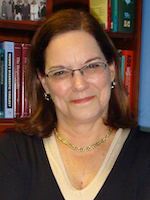 |
Lynn Pulliam, Ph.D.
University of California, San Francisco
2019 recipient of the
ISNV Pioneer in NeuroVirology Award |
Dr. Lynn Pulliam was recently recognized as the recipient of the 2019 Pioneer in NeuroVirology Award. The award was announced and presented on November 15th, 2019, during the 16th International Symposium on NeuroVirology and 2019 Conference on HIV in the Nervous System.
Dr. Pulliam received her B.A. in Biology in 1969 from Northwestern University, followed by her M.S. degree in Microbiology from the California State University in 1975. She continued at the University of California in San Francisco and received her Ph.D. degree in 1983 in Experimental Pathology – Neuropathology. Dr. Pulliam trained with neurologist Dick Baringer at UCSF in a large Neurovirology and Neuroimmunology group and originally studied HSV in chimeric mouse brain aggregates. She was offered the position of Director of Microbiology at the San Francisco Veterans Affairs Medical Center and Assistant Professor at UCSF after her PhD. She has appointments in Laboratory Medicine and Medicine at UCSF and has served on the most prestigious committees at UCSF, including the promotion and tenure committee for years. She held the position of Director of Research at the San Francisco VA Medical Center for 7 years, which is the largest VA research center in the U.S. She is the first woman to hold this position nationally with oversight of 200 PIs and $80M/year in research funds.
Dr. Pulliam's research has focused on HIV neuroimmunology, biomarkers for HIV neurocognitive impairment, and the effects of HIV and aging. She was the first to develop a human brain aggregate model used to study species-specific viruses. She used these brain aggregates to show human CMV infection of monocyte/microglia in the brain and later to show that HIV neuropathogenesis was caused by soluble factors from HIV-infected monocyte/macrophages - now known as a cytokine storm – rather than the virus. She went on to show that gp120 is toxic to brain cells and that HIV Tat inhibits neprilysin and elevates soluble amyloid beta. Her work on monocyte gene expression in PTSD resulted in separate clinical trials for women with PTSD. She began studying monocyte exosomes and their immune consequences early in exosome discovery. She recently reported that neuron-derived exosomes in the plasma have protein targets that correlate with cognitive impairment and differ in men and women. Her research has also included HIV coinfection with hepatitis C and the association between a monocyte interferon gene expression profile and neurocognitive impairment in this cohort, as well as the effects of chronic inflammation on modified lipid uptake in HIV-infected subjects. These projects highlight basic and translational research associated with inflammation.
Dr. Pulliam was one of the original members of the ISNV and has served as President and Meetings Co-Chair for many years. She was also the recipient of the 2009 Women in Neuroscience Lectureship. Dr. Pulliam has won several scientific awards on the effects of HIV in the brain, including the Prize in Neurovirology from Drexel and the Northern California Research Institute award for research and leadership. She teaches medical residents and infectious disease fellows year-round at UCSF and has received the UCSF Departmental Teaching award. She is committed to mentoring nationally through the International Society for Neurovirology. Her research has been funded by the NIH for over thirty years and she continues to serve as a reviewer for the NIH on multiple study sections and for numerous scientific journals.
The Pioneer in NeuroVirology Award is presented in recognition of outstanding individual achievement in the field of neurovirology. Each International Symposium on NeuroVirology honors a worthy recipient of this award. Pioneers in NeuroVirology have been recognized by the International Society for NeuroVirology since 1999. Dr. Pulliam is the 15th Pioneer in NeuroVirology to be recognized by the Society. By conferring this award, the ISNV recognizes Dr. Pulliam as a true pioneer for her extensive contributions to neurovirology and beyond.

